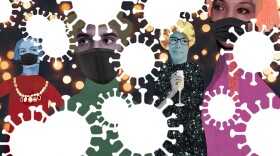
Michaeleen Doucleff
Michaeleen Doucleff, PhD, is a correspondent for NPR's Science Desk. For nearly a decade, she has been reporting for the radio and the web for NPR's global health outlet, Goats and Soda. Doucleff focuses on disease outbreaks, cross-cultural parenting, and women and children's health.
In 2014, Doucleff was part of the team that earned a George Foster Peabody award for its coverage of the Ebola outbreak in West Africa. For the series, Doucleff reported on how the epidemic ravaged maternal health and how the virus spreads through the air. In 2019, Doucleff and Senior Producer Jane Greenhalgh produced a story about how Inuit parents teach children to control their anger. That story was the most popular one on NPR.org for the year; altogether readers have spent more than 16 years worth of time reading it.
In 2021, Doucleff published a book, called Hunt, Gather, Parent, stemming from her reporting at NPR. That book became a New York Times bestseller.
Before coming to NPR in 2012, Doucleff was an editor at the journal Cell, where she wrote about the science behind pop culture. Doucleff has a bachelor degree in biology from Caltech, a doctorate in physical chemistry from the University of Berkeley, California, and a master's degree in viticulture and enology from the University of California, Davis.
-
People taking weight-loss drugs Ozempic and Wegovy report a dampening of the urge to drink. Here's how the drugs curb cravings and what that could mean for helping treat addiction.
-
A striking decline in teen mental health has coincided with the rise of smartphones and social media. Is social media causing the mental health challenges? Finally, research can answer that question.
-
New versions of omicron are circulating in the United States and South Africa. Two new studies shed light on the potential for future surges — and the risk factor if you've already had omicron.
-
You might want to cancel that holiday party, and definitely dust off your face mask. Don't panic, but do step up your precautions. Here's how.
-
The World Health Organization deemed it a variant of concern, and the U.S. is banning travel from parts of Africa where it's spreading. Here's what scientists know and what they're trying to learn.
-
Public health figures believe a focus on boosters for the already vaccinated will hasten the emergence of new variants among the billions of unvaccinated people — including a vaccine-resistant strain.
-
For decades, the U.S. has spent many millions hunting down viruses in hope of stopping a pandemic. Yet the efforts failed. A group of researchers thinks there's a better strategy for the future.
-
The report states that the coronavirus most likely did not originate at the wet market in Wuhan and that a lab leak was "an extremely unlikely pathway."
-
Scientists are looking at a possible link between the mutations in the U.K. and South Africa — and those in a patient in Boston who had living, growing virus in his body for five months.
-
One day you're worrying about the regular old coronavirus. Then — seemingly out of the blue — there are variants. Worrisome variants! How did they come to be? And why are they likely more contagious?








